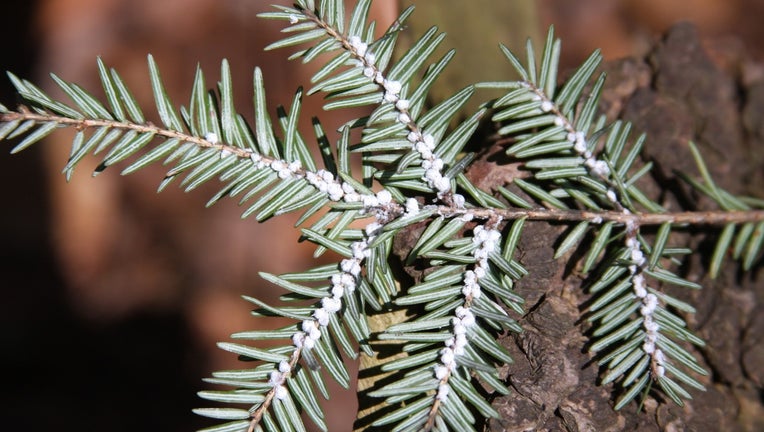Hemlock woolly adelgid confirmed in 7 Michigan counties - here are signs to watch for

Round, white hemlock woolly adelgid ovisacs are found on the undersides of branches near the base of the needles. (Photo: DNR)
(FOX 2) - Planning on taking a hike this winter? The state has a request for anyone with vigilant eyes: be on the lookout for the invasive hemlock woolly adelgid.
Winter is the best time to find the pest since cooler temperatures trigger the insect's feeding activity, which prompts a white waxy material to emerge on the vegetation it's eating.
"The presence of these small, round, white masses makes it possible to identify infested trees," said Robert Miller, the invasive species specialist with the Michigan Department of Agriculture and Rural Development.
Not native to the area, the hemlock woolly adelgid poses a major threat to the state's estimated 170 million hemlock trees. So far, cases of the invasive species have been confirmed in seven counties: Allegan, Benzie, Mason, Muskegon, Oceana, Ottawa and Washtenaw.
The actual insect is small; only about 2 mm long. The females that overwinter are black, oval, and soft-bodied. They normally conceal themselves with the white waxy mass that secretes in the winter.
They lay eggs in the summer which hatch the following spring. In Michigan, they specifically target eastern hemlock trees, which can be identified as cone- or egg-shaped and tower up to 75 feet tall. They have feathery branches that like to droop and flat needles.
Anyone with hemlocks on their property are asked to assist with surveys the state is conducting by checking on the branches for the tell-tale signs of the insect.
MDARD says hemlock trees can be protected from the species with the proper insecticide treatment. Without treatment, infested trees can die within four years.
If anyone does find evidence, they're asked to report it to the state, either through the Midwest Invasive Species Information Network, which is located at MISIN.MSU.edu or by downloading the MISN app.
Reports also can be made by email to MDA-Info@Michigan.gov or by phone to MDARD’s Customer Service Center at 800-292-3939.

